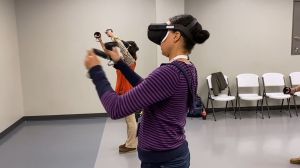NYC Schools Chancellor Carmen Fariña on leadership in education

Carmen Fariña exuded a warm but distinctively more mature demeanor than most of the Gen Xers and
millennials gathered to hear her speak at last week’s SXSWedu conference in Austin, Texas.
When Mayor-elect Bill de Blasio chose her to be chancellor of the New York City Schools in December 2013, the grandmother of three boys had already seen all there is to see in serving 50 years as a teacher, principal, superintendent and deputy chancellor in the nation’s largest school district, which today serves 1.1 million students in over 1,800 schools.
But the daughter of immigrant parents from Spain, who was born in Brooklyn and still lives there, can still light up a room. Her mixture of philosophies on leadership and the art of teaching — and a certain no-nonsense, bright-eyed engagement — had educators clapping for more.
Her accomplishments fill pages. During her first full year as chancellor, she established pre-kindergarten classes for tens of thousands of 4-year-olds; expanded the Community School model to provide services to students and families; launched a dedicated department to support English Language Learners; and increased funding for arts education and after-school programs for middle school students. That’s not say, her tenure hasn’t been without controversy, with critics charging too many of the city’s kids aren’t as prepared for college as the NYC Education Department claims.
But it was her Yoda-like advocacy for training teachers to be better learners, and helping rising educators to become better leaders, that earned nods of enlightenment during an hour-long session. (See more of our SXSWedu coverage here.)
Ursulina Ramirez, chief operating officer for the New York City Department of Education, who joined Fariña on stage, introduced her boss as a woman who leads by example, visiting at least three or four schools each week and writing generally positive notes to each principal. Ramirez knows because she’s responsible for following up on them — as well as Fariña’s countless other initiatives.
Here are some highlights from what Fariña had to say:
On leadership:
Fariña puts a premium in finding superintendents who have been successful instructional leaders. Among the first things she changed when she took the helm was to make it a requirement that candidates for leadership in the NYC school system had to have a minimum of seven years of solid pedagogy and teaching experience.
“We tend to think of leaders as mandating changes, instead of listing and engaging,” she said. “Managers have to know what’s working in the classroom,” she said. And one other thing: “They have to know how to develop trust. Do you do what you say your going to do?”
She also wants to break a pattern of principals keeping their best ideas to themselves to burnish their resumes.
“We reward schools that share their ideas,” she said, noting that principals are paid extra based on the number of ideas they share with other schools. “It’s about what are you doing well, how do you get better at it, and how do you bring along three people who can also learn how to do it,” she said.
On preparing students:
Fariña said schools need to recognize that the jobs students will be pursuing five years from now “won’t involve filling in the blanks and answering multiple choice questions.”
She takes pride in New York City’s efforts to make social studies classes a “pillar of critical thinking” — with curricula that has been adopted elsewhere, including by the Department of Defense agency that oversees schools at overseas military bases.
And she recalled with special satisfaction how New York City’s school system arranged for 20,000 11th-graders to see the hit musical “Hamilton” as a way to experience a piece of American history — and then asked students to act out something they learned when they returned to class.
The city has also instituted “AP courses for all,” starting for 10th-graders in every zip code in New York, allowing students to take coursework online from various city schools in the event their school can’t offer an AP course, she said.
On Computer Science:
“There are many of us raised without computer science as part of our knowledge base,” she said. “My 9-year-old grandson told me, ‘You’re much too old for this; you have too much stuff in your brain,’” she recalled, drawing laughs from the audience.
“Students can be the best teachers for teachers, “she said, telling of the time she sat with a 5th-grader who explained how Minecraft worked. “’I’ll tell you a secret,’ the student told me. ‘My teacher doesn’t get it and when she’s stuck, she asks me for help.’ How constructive is that?”
On another occasion, the chancellor said, she sat down with a first-grader who was doing a basic computer science coding activity. The student volunteered: “’Let me show this. You know it may be hard for someone your age, but don’t worry, someone can help you.’”
“I believe in computer science, but I think it’s also about teachers and students learning together,” she said.
On professional development:
“I’m a major believer in professional development,” she said, adding, “I saw how much you can get teachers to change if you give them the tools to change.”
Fariña said she worked with the United Federation of Teachers union to get 80 minutes of time set aside every Monday dedicated to professional development activities, and made sure schools had the necessary materials to support professional development. She also stressed the importance of sharing ideas on what worked.
On engaging with parents and her staff:
She also worked with the UFT to set aside an additional 40 minutes each workweek for teachers to have the time to reach out and engage with parents, making calls and sending notes, she said.
“They’re our partners. For too long, the assumption was that parents ‘don’t get it.’“ Instead, teachers are now being encouraged to draw parents into the instructional process, including many who are new to the United States and unfamiliar with what schools are trying to teach their kids.
The goal, she said, is to help parents understand that “they are the first teachers of their kids.” And the 40 minutes gives teachers a valuable window to help parents get a glimpse of their children’s victories. “We don’t do enough celebrating,” she said.
Fariña’s vision also extends to her staff, where her routine includes having one-on-one conversations with all 50 of her superintendents, in which she says, she asks just three questions: “’What did you do so far that you’re proud of? What are doing that’s creating an obstacle for you? And, what do I need to do to make your job easier?’”
“I get so much more information that way than through surveys and general meetings,” she said.
Her message to the 1,600 school principals who also report up to her: “I want to make sure they understand, I’m supporting them,” she said.
On the new federal Education secretary:
What advice would she offer Betsy DeVos, the new secretary of Education?
“Don’t judge what you haven’t visited,” Fariña said. “And don’t judge what you’ve only heard through hearsay.”
She also challenged DeVos to see what public schools are capable of doing. “Let me show you what the miracles are that are possible,” she said, reminding her audience at SXSWedu that public schools were started as a way to assimilate immigrants into society and teach them how to be productive citizens.
‘Public education is the Ellis Island of today that it was many years ago,” she said, speaking like the proud daughter of American immigrants.




